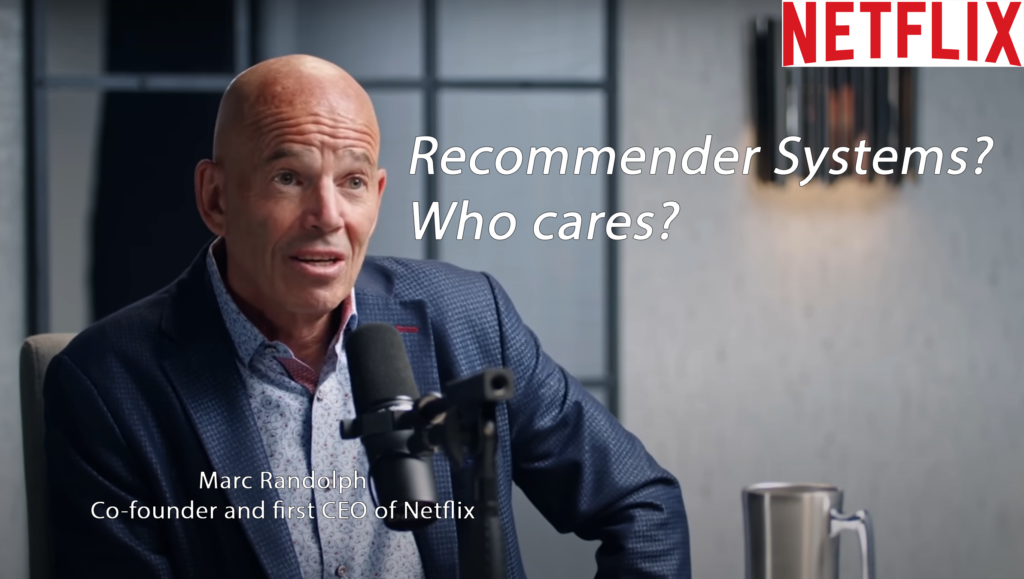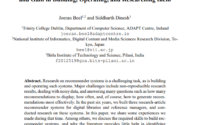Netflix’s Journey: Early Challenges and the Absence of Recommender Systems in Marc Randolph’s Vision
A recent 2-hour interview with Marc Randolph, the co-founder and first CEO of Netflix, provides a fascinating look into the early days of the company. Unlike many discussions about Netflix, this interview does not focus on the recommender systems that have become synonymous with the company’s success. This absence is intriguing given that Netflix often emphasizes how vital these systems are to their business model. Nonetheless, the interview highlights several key aspects of Netflix’s evolution, offering a rare glimpse into its strategic pivots and early struggles. While the title of the video — “They are lying to you about hard work” — is rather clickbait (as is my teaser photo ;-), the video itself is a worthwhile watch (all two hours; but if you are in a hurry, read the summary below).
While Netflix is now a leader in personalized recommendations, it was originally founded on a simple yet bold idea: to rent DVDs by mail. Randolph shares stories about the challenges of launching this service, the decision-making process behind key innovations, and the unexpected developments that led to Netflix becoming a major player in the streaming industry. Here is a summary of the most important insights from the interview:
Summary of Key Insights
- Founding and Early Struggles:
- Randolph describes the initial concept of Netflix as a DVD rental-by-mail service, which was far from an instant success. He recounts how the idea seemed almost ridiculous at first, as many doubted people would rent DVDs through the mail. However, Netflix was able to test the concept cheaply and quickly, which allowed them to iterate on their business model.
- Pivotal Business Decisions:
- One of the most critical shifts in Netflix’s strategy was the introduction of a subscription model with no due dates or late fees. Randolph emphasizes that this was a game-changer because it addressed a major pain point for customers who were used to being penalized by late fees from traditional rental stores like Blockbuster. This transition helped Netflix differentiate itself and gain customer loyalty.
- Another significant early decision was the choice to focus on DVDs instead of VHS tapes, as DVDs were smaller, lighter, and easier to ship. Randolph shares how this bet on emerging technology was instrumental in Netflix’s success.
- Entrepreneurial Lessons:
- The interview reveals Marc Randolph’s approach to entrepreneurship, which involves embracing the idea that “every idea is bad, we just don’t know why yet.” He advocates for quick, low-cost experimentation to validate or discard ideas. This mindset allowed Netflix to pivot and find a viable business model.
- Randolph also discusses the importance of not getting attached to any particular idea and being willing to pivot based on customer feedback. He and his co-founder, Reed Hastings, regularly tested and refined their approach until they found a model that worked.
- The Role of Risk and Failure:
- A recurring theme in the interview is the acceptance of failure as part of the process. Randolph emphasizes that many of Netflix’s successes came from learning what didn’t work. He believes that companies must foster a culture that encourages risk-taking and experimentation without fear of blame.
- Leadership Transition:
- Randolph shares the story of how he stepped down as CEO, allowing Reed Hastings to take over. This decision was rooted in a recognition that Hastings’ strengths in scaling companies were needed to grow Netflix further. Randolph reflects on how this was one of the best decisions he made for the company, as it allowed Netflix to thrive under Hastings’ leadership.
- Netflix’s Evolution and Market Challenges:
- Although the interview does not discuss recommender systems, Randolph’s reflections on the early days shed light on how the company evolved into the tech giant it is today. Netflix’s ability to adapt, experiment, and innovate laid the foundation for later advancements, including their highly sophisticated recommendation algorithms.
Overall, the interview with Marc Randolph provides an insightful look at the entrepreneurial journey of Netflix, highlighting key moments and decisions that shaped the company’s path. It is particularly interesting to note how different the focus was during its early days compared to the present, where Netflix is known for its cutting-edge recommender systems. The absence of any mention of these systems in Randolph’s account serves as a reminder of how much Netflix has evolved over the years, from a simple DVD rental service to a global streaming powerhouse.

Disclaimer: Large parts of this post were created by ChatGPT based on a transcript of the video on YouTube.



